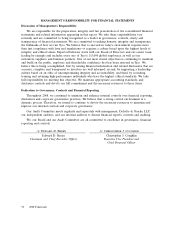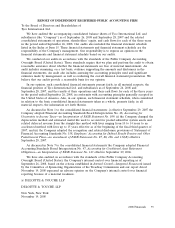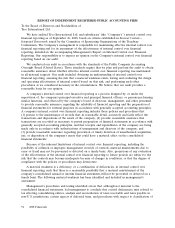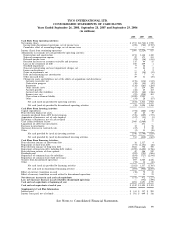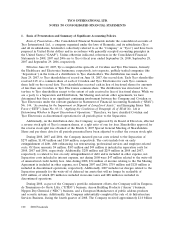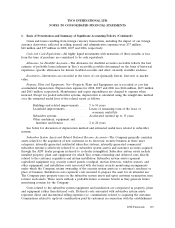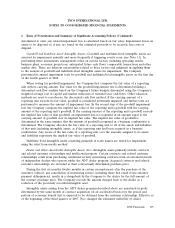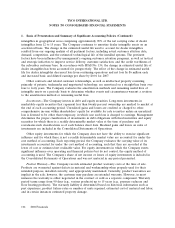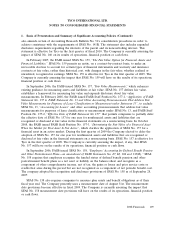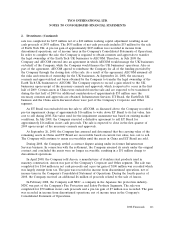ADT 2008 Annual Report Download - page 205
Download and view the complete annual report
Please find page 205 of the 2008 ADT annual report below. You can navigate through the pages in the report by either clicking on the pages listed below, or by using the keyword search tool below to find specific information within the annual report.TYCO INTERNATIONAL LTD.
NOTES TO CONSOLIDATED FINANCIAL STATEMENTS
1. Basis of Presentation and Summary of Significant Accounting Policies (Continued)
relative fair value method or the non-contingent up-front consideration received at the time of
installation, since collection of future amounts under the arrangement with the customer is contingent
upon the delivery of monitoring and maintenance services.
For transactions in which the Company retains ownership of the subscriber system asset fees for
monitoring and maintenance services are recognized on a straight-line basis over the contract term.
Non-refundable fees received in connection with the initiation of a monitoring contract, along with
associated direct and incremental selling costs, are deferred and amortized over the estimated life of
the customer relationship.
While we do not expect situations where fair value can not be objectively determined for sales of
security systems and services, if such cases were to arise, the Company’s policy is to recognize revenue
for all elements over the contract life.
Revenue from the sale of services is recognized as services are rendered. Customer billings for
services not yet rendered are deferred and recognized as revenue as the services are rendered and the
associated deferred revenue is included in current liabilities or long-term liabilities, as appropriate.
Contract sales for the installation of fire protection systems, large security intruder systems and
other construction-related projects are recorded primarily under the percentage-of-completion method.
Profits recognized on contracts in process are based upon estimated contract revenue and related total
cost of the project at completion. The extent of progress toward completion is generally measured
based on the ratio of actual cost incurred to total estimated cost at completion. Revisions to cost
estimates as contracts progress have the effect of increasing or decreasing profits each period.
Provisions for anticipated losses are made in the period in which they become determinable. Estimated
warranty costs are included in total estimated contract costs and are accrued over the construction
period of the respective contracts under percentage-of-completion accounting.
At September 26, 2008 and September 28, 2007, accounts receivable and other long-term
receivables included retainage provisions of $70 million and $63 million, respectively, of which
$51 million and $41 million are unbilled, respectively. These retainage provisions consist primarily of
fire protection contracts and become due upon contract completion and acceptance. At September 26,
2008 the retainage provision included $68 million, that is expected to be collected during 2009.
Research and Development—Research and development expenditures are expensed when incurred
and are included in cost of product sales, which amounted to $127 million, $120 million and
$111 million for the years ended September 26, 2008, September 28, 2007 and September 29, 2006,
respectively. Research and development expenses include salaries, direct costs incurred and building
and overhead expenses.
Advertising—Advertising costs are expensed when incurred and are included in selling, general and
administrative expenses, which amounted to $142 million, $132 million and $119 million for the years
ended September 26, 2008, September 28, 2007 and September 29, 2006, respectively.
Translation of Foreign Currency—For the Company’s non-U.S. subsidiaries that account in a
functional currency other than U.S. dollars, assets and liabilities are translated into U.S. dollars using
year-end exchange rates. Revenue and expenses are translated at the average exchange rates in effect
during the year. Foreign currency translation gains and losses are included as a component of
accumulated other comprehensive income (loss) within shareholders’ equity.
102 2008 Financials


